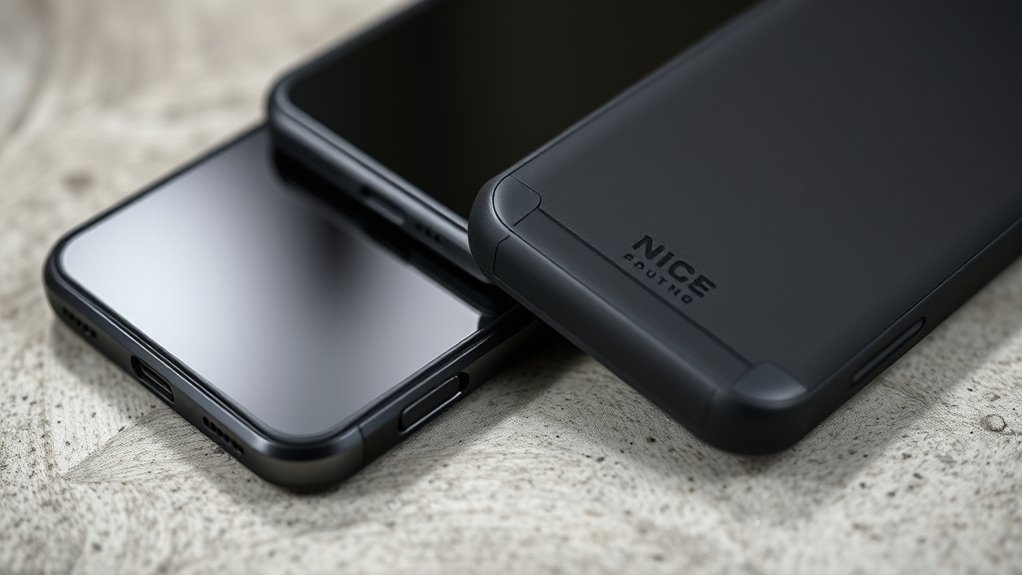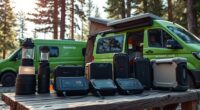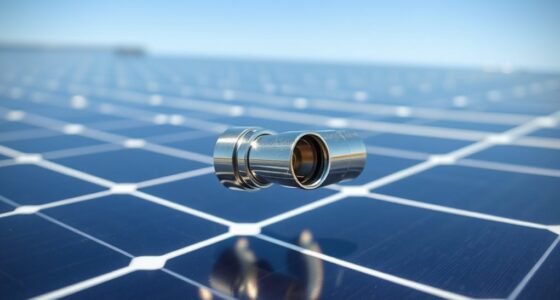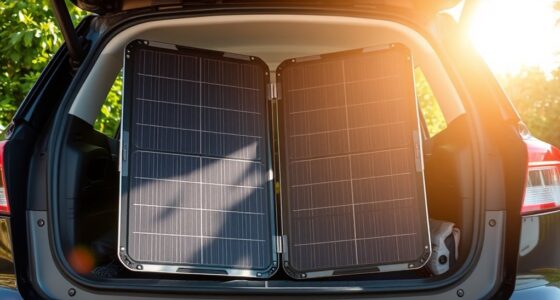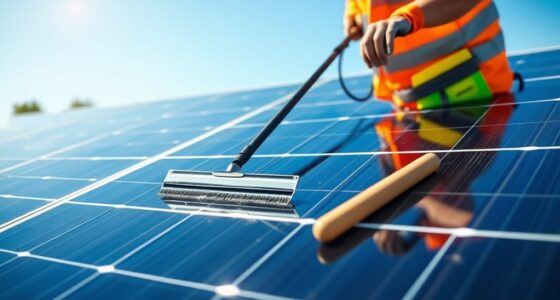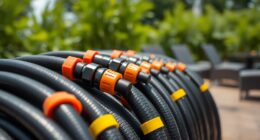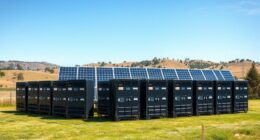To protect your panels, choose impact-resistant covers made from polycarbonate or tempered glass, which can withstand hail and debris. Opt for weatherproof materials like vinyl or high-density polyethylene to resist moisture and temperature changes. Easy-to-remove covers simplify cleaning and maintenance, reducing the risk of damage and debris buildup. Investing in high-quality, UV-resistant, and durable covers helps extend your panels’ lifespan and boosts efficiency. Keep exploring to discover more ways to keep your system running smoothly.
Key Takeaways
- Choose impact-resistant, weatherproof covers made from durable materials like polycarbonate or tempered glass to protect panels from hail and debris.
- Opt for UV-resistant coatings on covers to prevent degradation from prolonged sun exposure and extend their lifespan.
- Select easy-to-remove or clean covers to simplify maintenance, reduce cleaning efforts, and prevent damage during upkeep.
- Regularly inspect and clean panels while using covers to minimize dirt buildup and ensure optimal energy efficiency.
- Invest in high-quality protective covers to prolong system lifespan, maximize energy output, and reduce long-term maintenance costs.
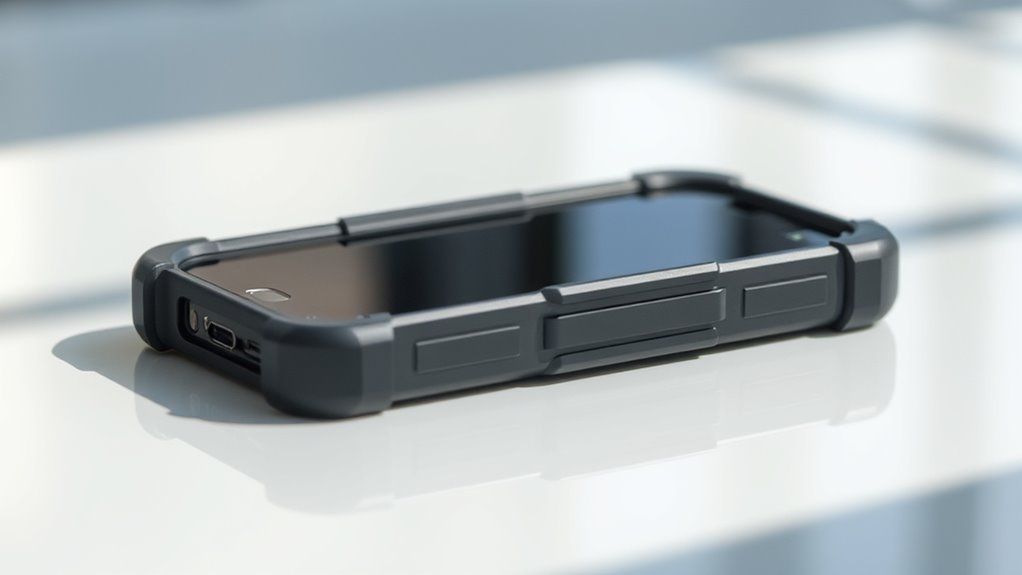
Your solar panels are a valuable investment, and safeguarding them guarantees they operate efficiently for years to come. One of the best ways to protect your panels is by understanding the importance of proper panel maintenance and selecting the right cover materials. Regularly inspecting your panels and keeping them clean is essential, but using durable covers can add an extra layer of protection against environmental damage, debris, and potential impacts. When considering covers, it’s vital to choose materials that won’t interfere with sunlight absorption or compromise the efficiency of your system.
Cover materials play a prominent role in protecting your panels from harsh weather conditions, such as hail, snow, or heavy rain. Polycarbonate and tempered glass are popular choices because they’re tough, impact-resistant, and transparent enough to allow sunlight to pass through without obstruction. These materials are lightweight yet durable, making them ideal for outdoor use and providing peace of mind during storms or hail episodes. Additionally, some covers are designed with UV-resistant coatings, which help prevent degradation from prolonged sun exposure and keep your panels clear of UV-related damage.
When you think about panel maintenance, it’s not just about cleaning the surface; it’s also about protecting the entire system. Regularly removing dirt, leaves, bird droppings, and snow ensures your panels operate at peak efficiency. However, applying protective covers or shields can reduce the frequency of cleaning needed by preventing debris from accumulating directly on the panel surface. This not only saves time but also minimizes the risk of scratching or damaging the panels during cleaning. Furthermore, covers that are easy to remove or clean themselves make ongoing maintenance more manageable.
Another vital aspect of protecting your panels involves selecting covers that are weatherproof and resistant to environmental wear. For example, covers made from materials like vinyl or high-density polyethylene can withstand exposure to moisture, wind, and temperature fluctuations. These materials are also resistant to mold and mildew, which can develop if moisture gets trapped underneath during rainy seasons. Properly chosen cover materials extend the lifespan of your panels, ensuring you get the most out of your investment without frequent replacements or repairs.
In addition, understanding the benefits of impact-resistant covers can help you choose options that offer superior protection against hail and debris, further prolonging your system’s lifespan.
In essence, protecting your solar panels involves a combination of diligent panel maintenance and smart choices in cover materials. Regular cleaning keeps your panels functioning efficiently, while the right covers shield them from external damage. By investing in quality materials that are impact-resistant, weatherproof, and UV-protected, you can greatly increase the longevity and efficiency of your solar energy system. Your proactive approach today will pay off in consistent energy production and lower maintenance costs over the years.
Frequently Asked Questions
Are Waterproof Covers Available for Outdoor Panels?
Yes, waterproof covers are available for outdoor panels, offering excellent waterproof durability and outdoor protection. You can find covers designed specifically to withstand rain, snow, and other harsh weather conditions, ensuring your panels stay dry and functional. These covers are easy to install and remove, giving you peace of mind that your outdoor panels are protected from moisture and environmental damage. Investing in a waterproof cover is a smart way to prolong your panel’s lifespan.
How Do I Clean and Maintain Protective Cases?
To clean and maintain protective cases, follow simple cleaning tips like gently wiping with a damp cloth and avoiding harsh chemicals. Regular maintenance routines include checking for cracks or damage, ensuring seals are intact, and keeping vents clear. This helps prolong the case’s lifespan and ensures your panels stay protected. By staying consistent with these practices, you can keep your protective cases in top condition and your panels safe from harm.
Do Cases Affect Panel Heat Dissipation?
Think of cases like jackets for your panels, affecting thermal management just like clothing influences body heat. Different case materials, such as plastic or metal, can trap heat or allow airflow, impacting heat dissipation. While some cases might insulate your panels too well, causing overheating, others promote better heat dissipation. So, choose cases that balance protection with effective heat management to keep your panels cool and functioning preferably.
Are There Eco-Friendly Cover Options?
You’re wondering if eco-friendly cover options exist. Yes, you can find covers made from biodegradable materials or recycled plastics. These options help reduce environmental impact while protecting your panels. Look for covers labeled as eco-friendly or sustainable, and they’ll often be durable and effective. By choosing these, you’re supporting greener practices and ensuring your panels stay protected without harming the planet.
Can Covers Be Customized for Specific Panel Sizes?
Yes, covers can be customized for specific panel sizes, giving you better panel size customization options. You can find covers that fit snugly or opt for adjustable ones to guarantee a precise fit. Many manufacturers offer cover fitting options tailored to your panel’s dimensions. This way, you get a perfect fit that protects your panels effectively, whether you need a standard or a custom-sized cover.
Conclusion
Now that you know the best cases and covers to shield your panels, the question isn’t just which one to choose—it’s what unexpected threat might still be lurking. Will your new protection hold up against the unknown challenges ahead? Remember, even the strongest cover isn’t foolproof. Stay vigilant, stay prepared, and keep your panels safe. Because in the end, the real test isn’t just protection—it’s what happens when the unexpected strikes. Are you ready?
